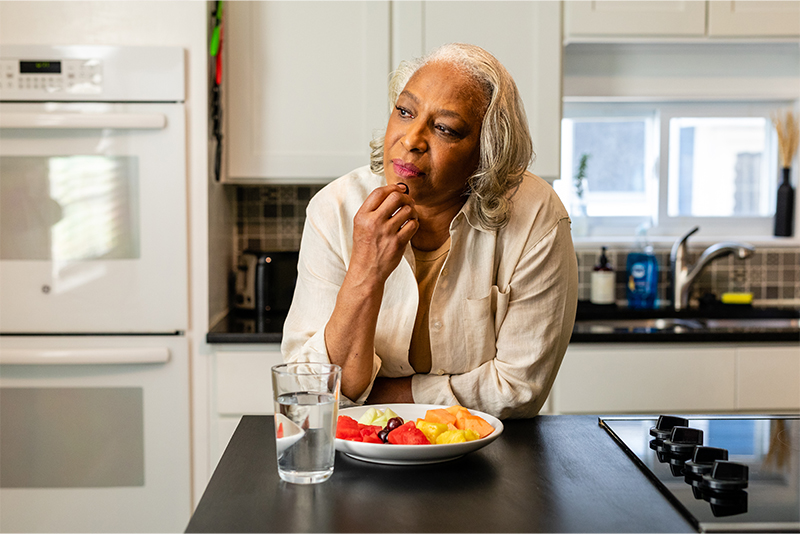Why Won’t Mom Eat? It Might Just Be an Eating Disorder.


If you’ve been wondering, “Why won’t Mom eat?” it’s important to know the signs of an eating disorder.
Changes in appetite and weight are often considered a normal part of aging. But if you find yourself asking, “Why won’t Mom eat?” it’s important to consider all possible reasons. While factors like medication side effects, dental concerns, or reduced mobility can certainly play a role, there’s another potential cause that often goes unnoticed: eating disorders in seniors.
Though eating disorders are commonly associated with younger individuals, late-onset eating disorders are becoming increasingly prevalent among older adults. Research indicates that anorexia nervosa is the most common, accounting for 81% of eating disorders in seniors. Identifying the warning signs early is crucial to ensuring a loved one receives the help they need.
Signs an Older Adult May Have an Eating Disorder
If you suspect an eating disorder, it’s important to look beyond common stereotypes. Eating disorders can develop at any age, and the signs may not always be obvious. Be on the lookout for:
- Avoidance of meals or insisting on eating alone
- Frequent trips to the bathroom after eating, which may indicate purging
- Negative self-talk about body image or weight
- Laxative or diuretic use
- Unexplained stomach or dental issues
- Thinning hair or noticeable hair loss
According to Cynthia Bulik, PhD, a professor specializing in eating disorders at the University of North Carolina at Chapel Hill, “Eating disorders take a tremendous toll on just about every bodily system. In old age, these body systems are less resilient to begin with…so eating disorders can erode them more quickly and more seriously.” This makes early intervention critical.
Anorexia vs. Bulimia: Understanding the Differences
Though anorexia nervosa is the most common eating disorder in seniors, bulimia nervosa can also pose serious health risks, including heart complications. Understanding the differences between the two can help families and caregivers take appropriate action.
- Anorexia nervosa is characterized by extreme food restriction, obsessive weight monitoring, wearing loose clothing to hide weight loss, and excessive exercise, sometimes to the point of exhaustion or fainting.
- Bulimia nervosa includes binge eating episodes, followed by purging behaviors such as vomiting, laxative use, or enemas.
In both cases, individuals are often fixated on weight, body shape, and food, yet may not recognize that they have a problem. This makes it especially important for family members and caregivers to stay alert to warning signs and take action when necessary.
What to Do if You Suspect an Eating Disorder
If you notice signs of an eating disorder in a loved one, seek medical guidance immediately. A doctor can evaluate their health, provide a diagnosis, and recommend treatment options.
Professional home care can also help. Our trained caregivers at Hired Hands Homecare provide:
- Nutritious, appealing meal preparation to encourage healthy eating
- Companionship during mealtimes to create a positive and social dining experience
- Monitoring for concerning behaviors with immediate reporting of any troubling symptoms
We’re Here When You Need a Helping Hand
Hired Hands Homecare is always on hand to help as well. We can prepare meals that are both nutritious and appetizing, and provide companionship during mealtime to make it more enjoyable. Our caregivers also watch for and immediately report any troubling symptoms. Call us at (866) 940-4343 for more information on our home care services in Novato, San Rafael, Santa Rosa, and throughout the Bay Area.








Leave a Reply